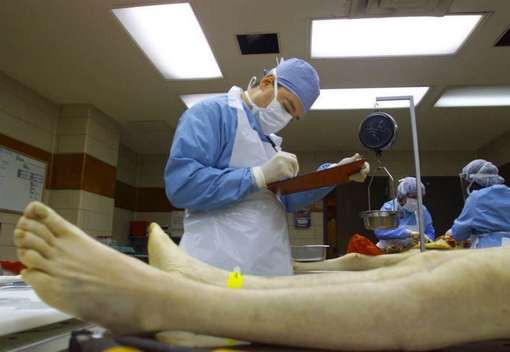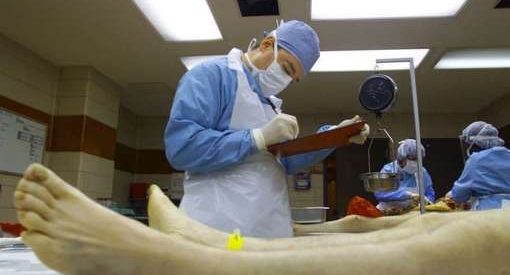
How to Become an Embalmer
Embalmers are professionals that use chemicals to forestall body decomposition and preserve human remains for long periods of time. This noble skill is essential to the funeral industry, and as a career path, it has much to offer. Embalming requirements vary from state to state, but the vast majority demand an associate degree in funeral service. As challenging as it is rewarding, most embalmers must be available on call and carry a pager at all times so that they can always be reachable. While working during a holiday or a special date may be a deal-breaker for some, to others embalming is an extremely gratifying activity and definitely worth the sacrifices.
Becoming an embalmer can prove to be a very difficult task. The technical skill required by this trade obligates you to attend embalming school, and aim towards an embalming license. Embalmer education typically takes at least two years of full-time study and includes anatomy, physiology, pathology, embalming techniques, restorative arts, ethics, funeral service law, and more.
What is an Average Embalmer Salary?
Not only extremely gratifying and fulfilling, but an embalming career also offers great benefits and financial reward. According to the United States Bureau of Labor Statistics, the average embalmer salary in the United States is $45,060 a year.
Even though the initial embalming salary is not the greatest, once some experience is acquired, chances are that an embalmers salary will go up to an average of $64,400 a year, and potentially even more.
Embalmer Job Description: What does an Embalmer Do
You would be surprised at how many people still ask themselves ?what is an embalmer??, or ?what does an embalmer do?. To briefly summarize an embalmers job description, one must first understand the full extent of the technique, its applications, and the importance of the trade.
Essential to the funeral industry, embalmers and their very specialized skill set are responsible for embalming and preparing the bodies of the deceased for funeral service, as well as burials or cremations. With a broad spectrum of activities, embalmers are, amongst other things, responsible for removing the blood from bodies and replacing it with embalming fluid, performing complex reconstruction to disguise damage, and using nothing but makeup, giving the deceased a peaceful and comforting appearance.
Embalmers are in constant contact with the deceased. This also means regular exposition to bodily fluids and, possibly, infectious diseases. Highly traumatic situations are also inevitable when it comes to trade: child deaths, victims of traumas, and more. That is why embalmers go under overwhelming amounts of mental training: developing the required stamina to endure the large amounts of stress resulting from the extremely long work hours.
As an embalmer, a normal day will involve activities such as: disinfecting the bodies of the deceased to stave off possible infections and deterioration, replacing bodily fluids and gases with embalming fluid (or preserving agents as they are also commonly referred to as), washing and styling the hair of the deceased, and in some cases, using makeup to perform facial reconstruction.
Embalmers also work very close to funeral directors, this partnership focus on ensuring all of the families? wishes are met, and all state and federal safety and health regulations are complied with. In some cases, the embalmer may also be responsible for keeping the mortuary stocked and doing all the necessary paperwork. In smaller facilities, the embalmer is usually also the funeral director.
Embalming Education Requirements and Embalming Licenses
Embalmer education requirements are one of the most demanding out there. Those who wish to pursue a career in embalming must first get proper education and training from a recognized and accredited embalming school and achieve an embalming license. Currently, there are 60 American Board of Funeral Service Education accredited programs. Embalming schools normally offer both associate?s degree programs and bachelor?s degree programs. Those programs are responsible for preparing people to work as embalmers using a combination of complex coursework, and hands-on experience through apprenticeships. Embalmers licensed through this type of embalmer education must have at least a 2-year accredited mortuary science degree.
Mortuary science degree programs are the big catalyst that provides students with all the required knowledge and skills for the trade. These courses normally include everything from anatomy, pathology, and physiology to ethics, communication, and grief counseling. The main focus of the anatomy course is to learn the major systems of the human body, with emphasis on the muscular and circulatory systems. While studying anatomy, students will also be dissecting cadavers and studying organs and cells. During the embalming course, every important technique and procedure for cadaver preservation, and posing facial features are explained. Students also learn about disinfection, blood drainage, chemicals used in embalming, and fluid injection through lab work.
In addition to the technical classes, students must also take courses in business management, law and ethics, and others. Office and human management, human resources, documentation, and funeral terminology are all parts of an embalmers? set of skills.
After graduating, an apprenticeship that provides hands-on experience in the funeral industry is obligatory. Those may last up to three years and must be completed under the supervision of a licensed funeral director. The internship is of utter importance since it allows students to be fully prepared to work in the field.
Additional Tips and Information
The competition for jobs can be fierce at times, to say the least. Preparing a professional looking resume that causes the best possible first impression will take you a long way. When it comes to your dream job, research the employer to whom the resume or cover letter will be sent to, and make sure to show that you have a deep understanding of the mission and values of the business.
According to the BLS, statistics show that there will be a high demand for embalmers in the coming years. This growth is partially due to the aging baby boomer population and an increased demand for quality care for the deceased.
Among the qualities of a good embalmer are the capacity of feeling empathy for the grief of the family, the ability to maintain a responsible outlook on the work, and be self-motivated. Embalmers must also have a very strong stomach when it comes to both eyes and nose, be respectful towards the deceased body and the families? religion or wishes, and be ever mindful of laws and regulation.


